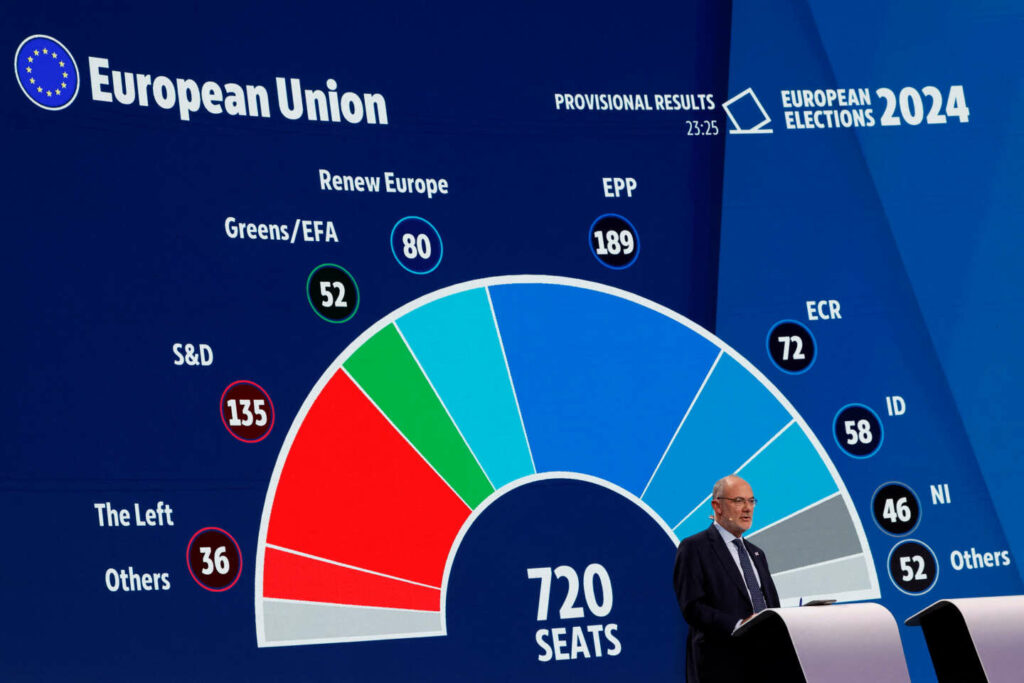The European Parliament is solidly anchored on the right, with far-right representation stronger than in the previous term. However, for the time being, they are divided into heterogeneous groups. This is the initial picture painted by the elections held from June 6 to 9 in the 27 member states of the European Union. The European People’s Party (EPP), which brings together conservative and center-right elected representatives, remains the most powerful group. Meanwhile, the Social Democrats have lost ground, and the Green and Liberal parties have also lost ground to the radical right.
Read more Subscribers only European election results: A more conservative Parliament under pressure from far right
However, a geographical examination offers a different interpretation of the results. The rise of the far right is spectacular in Western Europe, particularly in the old democracies that experienced totalitarian or authoritarian regimes in the last century. It is establishing itself as a political force in the three largest founding members of the Union. France is the most striking example, with the far-right Rassemblement National (RN) and other radical right-wing parties collectively counting for nearly 40% of the vote.
However, in Italy too, the Fratelli d’Italia party came out on top, consolidating the seat of Council President Giorgia Meloni. The far more radical AfD is making a worrying breakthrough in Germany, especially in the eastern regions, where it secured 40% of the vote in Saxony. However, it still trails behind the CDU-CSU at the federal level. In Austria, the FPÖ is in the lead. In Belgium, the nationalists inflicted a heavy defeat on the government. In contrast, Geert Wilders’ far-right party was defeated by the left in the Netherlands.
Read more Subscribers only EU election results: Giorgia Meloni consolidates her position both in Italy and in Europe Voter disillusionment
On the other hand, the far-right parties and their illiberal counterparts in post-communist central Europe suffered a setback in a region that appeared to be their cradle. In Poland, Prime Minister Donald Tusk succeeded in turning the October 2023 national elections around. The center-right coalition he leads came out on top again on Sunday, ahead of the Law and Justice party (PiS), which had undermined the rule of law during its eight years in power.
Read more Subscribers only Polish Prime Minister Donald Tusk’s pro-European party topples the far-right PiS
In Slovakia, the party of Prime Minister Robert Fico, an emulator of his Hungarian counterpart Viktor Orban, was defeated by the Progressive Party. In Hungary itself, Orban’s Fidesz remains solidly in the lead but lost ground for the first time to the formation of a new opponent, Péter Magyar.
In Romania, a coalition of Social Democrats and Liberals greatly defeated the far-right party, which won just 15% of the vote. The dissatisfaction of the far right is also notable in the Nordic countries, to the benefit of the Social Democrats.
Read more Subscribers only European elections: Far-right on the decline in Nordic countries
Perhaps the takeaway from these results is that voters are disillusioned with populist parties in power. In these regions, the war in Ukraine and the proximity of the Russian threat also played a mobilizing role in favor of resolutely pro-European parties, with the European Union and the unity of its members seen as a form of protection.
This new east-west democratic divide may alter the balance at the European Council table. The personal influence of Chancellor Olaf Scholz and President Emmanuel Macron, both weakened by the disapproval of their voters, will be diminished.
Translation of an original article published in French on lemonde.fr; the publisher may only be liable for the French version.
Reuse this content
Source link : https://www.lemonde.fr/en/opinion/article/2024/06/11/a-paradoxical-democratic-divide-in-europe_6674489_23.html
Author :
Publish date : 2024-06-11 10:10:10
Copyright for syndicated content belongs to the linked Source.
